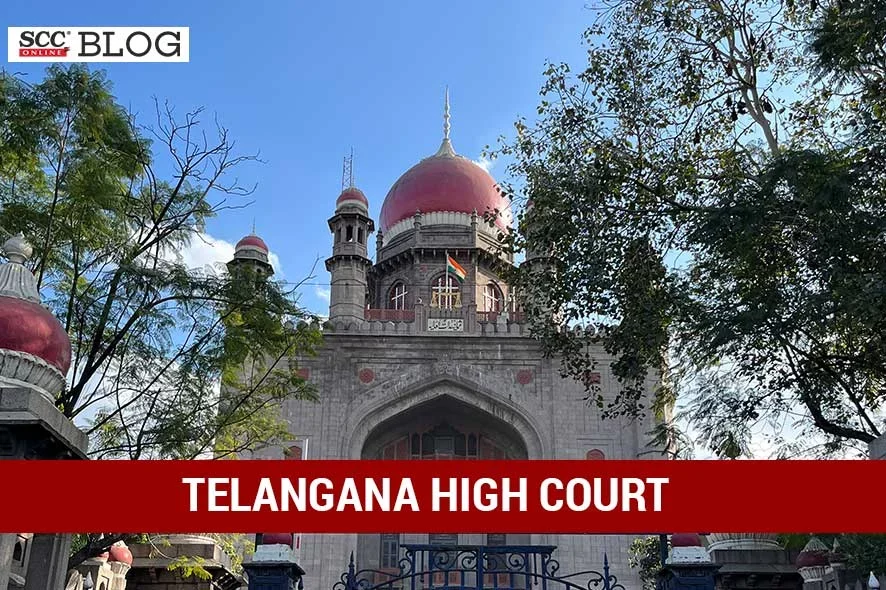Telangana High Court: In a case wherein the petitioner’s husband was removed from service by the respondent after an order in 2006 on the charge that he was absent from duties from 05-03-2006 to 23-03-2006 and that he maintained irregular attendance, Nagesh Bheemapaka, J.*, opined that it was clear that the workman suffered severe health setback and he was confined to bed till his death. Hence, the charged absence was unauthorised, but not wilful or by negligence, and the Court took a lenient view to be inclined to grant the relief prayed for by the petitioner.
Background
The petitioner’s husband worked as a conductor since 1986 till he was removed from service by the respondent after an order in 2006 on the charge that he was absent from duties from 05-03-2006 to 23-03-2006 and that he maintained irregular attendance. The petitioner stated that her husband died in November 2006 and aggrieved by the order of removal, the petitioner raised Industrial Dispute (I.D) before the Labour Court to treat her husband as in service from the date of removal till the date of death with all attendant benefits and back wages as her husband remained unemployed during the said period. The Tribunal passed an Award setting aside the order of removal and directing the respondents to count the service of the petitioner from the date of removal excluding the period of charged absence till his death with all attendant benefits but without back wages.
Contentions
The respondent contended that the Industrial Dispute itself was not maintainable before the Labour Court as the petitioner was not a ‘workman’ under the provisions of the Industrial Disputes Act, 1947 and further, the workman did not choose to question his order of removal till his death. Further the respondent stated that the deceased was charged for being absent from duties from 05-03-2006, in continuation of private sick leave from 17-12-2005 without any intimation or prior sanction of leave from his supervisors and for irregular attendance which caused inconvenience to the travelling public as well as to the supervisors for arranging substitutes to the duty besides loss of legitimate revenue to Corporation which constitute misconduct under Regulation 28(xxvii) and (ix)(a) of the APSRTC Employees’ (Conduct) Regulations, 1963.
It was revealed by Respondent 2 that an enquiry officer was nominated to conduct enquiry into the charges, but the workman failed to attend the enquiry and the Enquiry Officer conducted ex parte enquiry and submitted a report holding that the charges were proved. Thus, Respondent 2 finally concluded that the charges were proved and passed order of removal on 12-07-2006.
Whereas the petitioner argued that the Tribunal having held that the removal was unjustified, and directing the respondents to count the service of the workman from the date of removal excluding the period of charged absence till his death was not proper, and that the Tribunal ought to have granted continuity of service of the deceased till his death.
Analysis, Law, and Decision
The Court observed that the Labour Court held that domestic enquiry conducted by the management was valid and the charges were proved. Further, the Court noted that the Tribunal took a lenient view and observed that the unauthorised absence was not willful and as such, passed the Award continuing the service of the workman from the date of removal till his death duly excluding the absence period for payment of all attendant benefits and thus, the same could not be interfered with. The Court noted that the deceased was sick for some time before the date of charged unauthorised absence, as he underwent surgery in January 2006 and was advised to take bed rest for two months, even after surgery; thereafter, illness of the deceased did not cure, and the sickness developed side-effects and it was probable to believe that they consumed the life of deceased.
The Court opined that the charged absence was unauthorised but not wilful or by negligence, hence, the punishment of removal was unjustified. Thus, the Court allowed the petition and while setting aside the order of removal, directed the respondents to count the service of the petitioner from the date of removal till his death with all attendant benefits payable to the petitioner but without backwages within a period of two months.
[Amrutamma v. Managing Director APSRTC, 2023 SCC OnLine TS 3023, decided on 31-08-2023]
*Judgment authored by- Justice Nagesh Bheemapaka
Advocates who appeared in this case :
For the Petitioner: A K Jayaprakash Rao, Advocate
For the Respondents: Thoom Srinivas, S.C.






